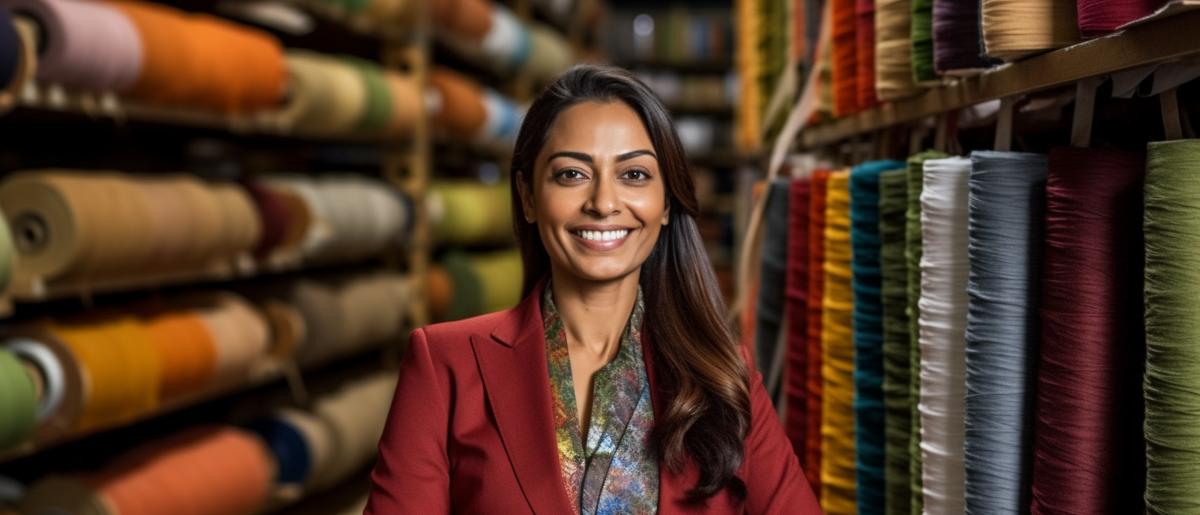

Financing solutions, such as business loans, are a crucial component in the smooth operation of a Textile Wholesaling business in Australia. Secure funding can act as an essential catalyst, enabling these businesses to grow and expand, usually by providing an immediate injection of capital. With this boost in finances, textile wholesalers can quickly respond to the market demands, purchase raw materials in bulk, and even finance innovative technology to enhance their efficiency and productivity. Investing in such initiatives can foster competitiveness, providing these businesses with a significant edge in the dynamic Australian marketplace. On the other hand, business loans can also provide a safety net during challenging times, such as economic downturns or periods of cash flow instability. This financial support is especially crucial in a sector like textile wholesaling, marked by its cyclical nature and subjected to fluctuations in global fibre markets. Thus, business loans prove to be an essential tool for Textile Wholesalers in Australia, driving their resilience, growth, and long-term success.
Compare over 40+ lenders with one application.
The textile industry holds a significant place in Australia's economy contributing to growth and employment opportunities. At the core of this industry are the textile wholesalers, who play an essential role in driving this sector forward. Textile wholesalers in Australia serve as a vital link in the supply chain. They connect manufacturers, both local and international, with an array of retailers, fashion houses, and other businesses, ensuring a smooth flow of goods and maintaining the rhythm of the industry. By providing a gateway to diverse and high-quality materials, wholesalers empower creativity, innovation, and adaptability, fostering Australia's fashion and design scene. The importance of textile wholesalers extends beyond commercial transactions. They are instrumental in promoting sustainable practises in the industry. As entities that handle large volumes of fabric, they are in a unique position to influence environmentally friendly sourcing and waste reduction. In recent years, many of these operators have shown a commitment to introducing organic, recycled, or low impact textiles into the market, marking significant strides towards sustainability. To add, they play a crucial role in providing employment opportunities. From warehouse operations to sales and logistics, many jobs are created and sustained due to their operations, amplifying their value within Australia's economic landscape. From boosting Australia's fashion prowess to fostering sustainability and promoting economy-wide growth, the impact of textile wholesalers is far-reaching and substantial. Their role underscores their strategic importance to Australia's vibrant and evolving textile industry. And as challenges and opportunities continue to emerge, their significance is only expected to grow.
Learn about eligibility and how to apply.
Navigating the vibrant yet demanding domain of textile wholesaling in Australia can seem like threading a dynamic loom – filled with various challenges. The fluctuations in global markets and continual dependence on import/export dynamics make for a mercurial textile industry landscape. One muscle-flexing impediment confronting textile wholesalers is the volatile prices of raw materials. The prices of cotton, wool, and other requisite textile materials swing erratically, subjected to countless global variables. This pricing instability often devalues stock-in-trade, creating financial contractions. Then, the rapid advancement in technology, while heralding efficiency, also ushers in a new era of disruptive turmoil. Adapting to technological evolutions requires immense capital input - a financial strain for many businesses. Keeping step with other challengers who might already embrace this digital wave presents another stirring competition. Heightened environmental regulations propound added operational burdens. The growing eco-consciousness amongst consumers and stringent environmental policies by the government requires wholesalers to adopt sustainable practises. This green transition calls for significant investment in eco-friendly technology and manufacturing processes, often proving costly. Lastly, market fluctuations and economic uncertainties can play a significant role in destabilising traditional business models. Economic slump or sudden trade policy changes could have a dramatic ripple effect on sales and profitability. In this complex and shifting terrain, navigating financial stability emerges as a common challenge, making the exploration of business loan avenues a crucial next step for textile wholesalers in Australia.
Calculate your repayment estimates and more.
The textile wholesale industry often necessitates large investment in inventory. A business loan proves invaluable, providing an instantaneous influx of capital that can be leveraged for the procurement of a vast range of textiles to meet diverse customer demands. This empowers textile wholesalers with the flexibility of maintaining an eclectic stock, and swiftly respond to market trends, thereby driving competitive advantage. Furthermore, maintaining robust stock levels can foster stronger business relationships with customers, by assuring consistently prompt delivery times. Another substantial benefit of a business loan is the capacity it creates for investment in business expansion. For instance, the funds can be utilised to increase the warehouse capacity, vital for accommodating a broader range of stock. It could also enable the business to broaden its presence across Australia, enabling the supply of textiles to a wider customer base. This prospective expansion could significantly boost revenue, fostering financial security and offering a buffer against industry uncertainties. Additionally, a business loan can facilitate essential modernisation efforts, crucial in the evolving textile industry. This might encompass the acquisition of advanced equipment to expedite processes, thus spurring productivity and efficiency. Likewise, investment in digital technology could simplify online sales, inventory management, and customer data analytics, ultimately leading to better business decisions. These improvements can cultivate an enhanced perception of the business amongst its clientele, promoting brand loyalty and potentially ushering in new customer segments in the long term.
For Australian textile wholesalers seeking financial support, three noteworthy loan types are available. Unsecured business loans provide quick access to funds without requiring collateral. Equipment finance aids in procuring industrial tools or machinery. Lastly, business lines of credit offer flexibility to draw funds as needed.
There are several types of business loans in Australia that can benefit Textile Wholesalers. Each of these loan types has its unique features, advantages, and potential disadvantages. Here are some of the most common types of business loans for Textile Wholesalers:
Invoice Factoring
With invoice factoring, Textile Wholesalers in Australia can leverage their unpaid invoices to access immediate funding. This type of loan helps businesses alleviate cash flow challenges associated with delayed invoice payments.
Equipment Finance
Such loans provide textile wholesalers with the resources to purchase, upgrade or repair essential machinery and equipment. These funds ensure uninterrupted operations and potential expansion of their production capabilities.
Business Line of Credit
This flexible loan gives textile wholesalers access to a pool of funds that they can draw from whenever they need. They only pay interest on the amount utilised which can be replenished when repaid.
Overdraft Loans
An overdraft loan is an arrangement with the bank that allows a business to borrow up to a certain limit as required. Textile wholesalers can use it for short-term capital needs or unexpected expenses.
Secured Business Loans
As the name suggests, these loans are ‘secured’ against an asset - generally property or equipment. It can be larger in sum and have a lower interest rate due to the reduced risk for the lender.
Unsecured Business Loans
This type of loan doesn't require any collateral but typically comes with a higher interest rate. It can be useful for textile wholesalers who need funds quickly and are confident in their ability to repay.
Merchant Cash Advance
A Merchant Cash Advance (MCA) allows businesses to borrow against their future earnings. This loan is repaid through a percentage of daily credit or debit sales, providing a flexible repayment structure.
Trade Credit
A commercial credit extended by suppliers allowing textile wholesalers to purchase goods and repaying the supplier at a later date. This arrangement can improve cash flow management.
Franchise Financing
This is primarily for textile wholesalers intending to open a new store or expand their existing franchise network. It covers costs related to infrastructure, equipment, and oftentimes even operating expenses.
Commercial Property Loans
These loans are designed for businesses looking to buy commercial property for their operations or investment. For textile wholesalers, this could mean purchasing a new warehouse, distribution centre, or retail space.
Business loans offer a financial boost to textile wholesalers in Australia. They could utilise these resources to expand product ranges, engage in innovative marketing strategies, or even open additional warehouse facilities. Investing in growth and pacing with consumer demands becomes more attainable with business credit support.
Here are some common reasons Textile Wholesalers use business loans:
Inventory Management
Ensuring a steady supply of items is of utmost importance for textile wholesalers. A well-stocked inventory is a guarantee for smooth operations, customer satisfaction, and ultimately, profit. Business loans can aid in maintaining and expanding the inventory for a broader, more diverse offering of textile goods.
Equipment Upgrade
Updated machines imply a boost in productivity and enhanced quality of textile materials. Business loans can facilitate the acquisition of advanced weaving, spinning, and dying equipment.
Work Space Expansion
Business loans can support wholesalers in expanding their workspace, including new warehouses for storing textile inventory more effectively and efficiently.
Technology Integration
Implementing new technology like inventory management software, customer database systems, or e-commerce platforms can streamline business operations. A business loan can fund such technological integration.
Staff Training
High-quality training programmes empower employees with necessary skills and expertise. A business loan can cover the cost of these training programmes, thereby investing in the quality of the workforce.
Marketing and Advertising
In an increasingly competitive market, effective promotion is crucial. A business loan can help in funding marketing campaigns, website development, and other advertising efforts to increase visibility and attract more customers.
Cash Flow Management
Business loans can provide an immediate injection of cash, useful in periods of decreased sales, thus ensuring smooth operation and protecting against unforeseen financial situations.
Product Development
For staying relevant in the textile industry, wholesalers might invest in designing and producing unique textile items. Business loans can cover costs related to research, development, testing, and the production of new product lines.
Export Opportunities
Business loans might finance the necessary equipment, transport, and licencing needed for exporting textiles overseas, opening new revenue streams.
Sustainability Efforts
Many textile wholesalers strive to implement eco-friendly practises. A business loan can be used to invest in sustainable machinery, or to transition to organic or recycled materials, promoting a sustainable business model.
To estimate your monthly repayments and the total cost of the loan, input the loan amount, loan term and interest rate into the calculator below. This helps you plan your budget and choose the most suitable loan terms.
These helpful FAQs will help you find the answers you need. If you can't find what you're looking for, you can request a callback below.